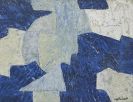
Niels Diffrient
1928 Star/Mississippi
The American designer Niels Diffrient is regarded as one of the most important designers of office furnishings, mainly because he worked up his practical analysis of the human body into the theoretical basis of ergonomy. Niels Diffrient studied aeronautical engineering from 1943 until 1946 at a technical college in Detroit before going on to the Cranbrook Academy of Art in Bloomfield, Hills, Michigan, to study from 1948 to 1953. While a student at Cranbrook, Niels Diffrient worked in the practice fo the designer Eero Saarinen. In 1954-55 Niels Diffrient had a Fulbright Scholarship to Italy, where he continued to study design and architecture and worked in Marco Zanuso's practice.
From 1956 until 1981 Niels Diffrient was employed at Henry Dreyfuss Associates in New York. At Dreyfuss Associates, Niels Diffrient designed airplane interiors for Hughes, Lockheed, and Learjet as well as medical equipment for Litton Industries and others. While he was working at Dreyfuss Associates, Niels Diffrient began to study anthropometric data. He published his findings with Alvin R. Tilley in the books "Humanscale 1-2-3" (1974), "Humanscale 4-5-6", and "Humanscale 7-8-9" (the last two 1981).
In 1981 Niels Diffrient opened a practice of his own, Niels Diffrient Product Design, in Ridgefield, Connecticut. From then on Niels Diffrient designed mainly office furnishings, for Knoll International (from 1979) and Sunar-Hausermann (from 1984). Niels Diffrient's ergonomic studies bore fruit in numerous seating concepts for innovative office chairs, including the 1979 "Diffrient Advanced Management" office chair and the "Humana" seating system, which were produced by Knoll. The "Diffrient Operational", chair (designed for Knoll), which adapts to the sitter's body, dates from 1980. "Helena", a chair launched in 1982 (for Sunar-Hausermann) can be adjusted to multiple positions and is, therefore suited to bodies of all weights and sizes.
In 1983 Niels Diffrient developed the "Jefferson" work chair for Sunar-Hausermann. This seating concept incorporates, as it were, an integrated, mobile workplace. The "Jefferson" chair can also be adjusted to all positions for seating comfort and even to a prone position; in addition, various different arms and work surfaces can be added to it for placing a computer and keyboard or a telephone and lighting can be attached to it.

Would you like to sell a work by Niels Diffrient?
Infos for seller






